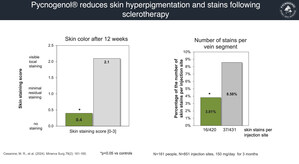HOBOKEN, N.J., March 26, 2019 /PRNewswire/ -- Just in time for the arrival of spring, a new study delivers promising new findings for osteoarthritis sufferers. A peer-reviewed and published study shows the efficacy of the super-antioxidant Pycnogenol®, in the form of a topical patch, for relieving joint inflammation and discomfort associated with osteoarthritis. Participants in the independent study applied a topical patch containing 110mg of Pycnogenol® in the area of pain twice daily over the course of three weeks.
Osteoarthritis affects more than 30 million1 U.S. adults, making it the most common arthritis condition in America. This condition can cause pain and stiffness2 in joints and loss of flexibility.
"Osteoarthritis affects the quality of life for millions. There is no cure but new research like this study show that natural supplements like Pycnogenol® can be effective in addressing the symptoms that interfere with everyday activities by reducing joint inflammation," said renowned natural health physician Dr. Fred Pescatore.
Pycnogenol® is a powerful antioxidant shown in nearly five decades of research to reduce inflammation in patients experiencing osteoarthritis symptoms. Pycnogenol® is a standardized form of French maritime pine bark extract rich with a unique blend of micronutrients called polyphenols that are shown to support joint health and directly distribute throughout joint synovial fluid.
The registry study examined 64 individuals diagnosed with osteoarthritis of the knee, confirmed by X-ray. Participants applied a topical patch containing 110mg of Pycnogenol® twice daily over the course of three weeks, applied as close as possible to the area of pain. Subjects in the Pycnogenol® test group were compared to a control group following standard management procedures.
Researchers evaluated osteoarthritis symptoms using a combination of subjective pain survey scales, thermal imagery of affected joints, individual capability of walking or standing without pain, and measurement of erythrocyte sedimentation rate (ESR) and C-Reactive Protein (CRP) which are commonly associated with inflammation.
Following three weeks of using the Pycnogenol® topical patch, subjects reported significant improvement of their symptoms, including:
- 51 percent improvement of pain score (vs. 19 percent in the control group)
- 64 percent improvement of inflammation (vs. 39.5 percent in the control group)
- 33 percent improvement of knee function (vs. 16.3 percent in the control group)
- 66 percent improvement of swelling (vs. 50 percent in the control group)
- 42.4 percent of subjects reported no osteoarthritis symptoms (vs. 23.5 percent in the control group)
In addition, subjects who wore the Pycnogenol® topical patch had significantly reduced ESR and CRP levels in blood samples, showing reduced inflammation overall. Study participants also reported their need for NSAID pain relievers, consultations with specialists and need of physiotherapy throughout the study diminished in the Pycnogenol® group:
- 62 percent of participants reported decreased use of NSAID products (vs. 16 percent in the control group)
- 88 percent of participants did not need consultations of a specialist (vs. 22 percent in the control group)
- 91 percent of participants did not need physiotherapy during the study (vs. 33 percent in the control group)
"Many osteoarthritis patients depend on daily use of NSAID pain relievers, These drugs can be costly and constant use can bring adverse side effects. This new study shows a viable drug-free osteoarthritis option. The results here are meaningful for those looking to manage their condition and build or maintain a more active lifestyle," said Dr. Pescatore.
Previous research published in the Journal of Phytotherapy Research in 2008 also indicates that supplementing daily with Pycnogenol® reduces overall knee osteoarthritis symptoms by 20.9 percent. Pycnogenol® is shown to naturally inhibit pro-inflammatory molecules while promoting production of collagen and hyaluronic acid to support cartilage health.
To review clinical research and additional information on Pycnogenol®, visit www.Pycnogenol.com. Pycnogenol® is available in more than 1,000 dietary supplements and multi-vitamins worldwide.
About Pycnogenol®
Pycnogenol® is a natural plant extract originating from the bark of the maritime pine that grows along the coast of southwest France and is found to contain a unique combination of procyanidins, bioflavonoids and phenolic acids, which offer extensive natural health benefits. The extract has been widely studied for the past 40 years and has more than 420 published studies and review articles ensuring safety and efficacy as an ingredient. Today, Pycnogenol® is available in more than 1,000 dietary supplements, multi-vitamins and health products worldwide. For more information, visit www.pycnogenol.com.
About Horphag Research (USA) Inc.
Horphag Research (USA) Inc., based in Hoboken, New Jersey, is the North American distributor for Pycnogenol® (pic-noj-en-all) brand French maritime pine bark extract and Robuvit®, French oak wood extract on behalf of Horphag Research. Pycnogenol® and Robuvit® are registered trademarks of Horphag Research Ltd. For its patented ingredient, Pycnogenol®, Horphag Research has been awarded the Frost & Sullivan Excellence in Research Award, Nutraceutical Business & Technology Safety & Quality Award, SupplySide West Scientific Excellence Award and The American Botanical Council's Tyler Research Award. Horphag Research (USA) has the exclusive rights to market and sell Pycnogenol® in North America and benefits from more than 40 years of scientific research assuring the safety and efficacy of Pycnogenol® as a dietary supplement. For more information, visit www.pycnogenol.com and www.robuvit.com.
1 CDC: https://www.cdc.gov/arthritis/basics/osteoarthritis.htm
2 Mayo Clinic: https://www.mayoclinic.org/diseases-conditions/osteoarthritis/symptoms-causes/syc-20351925
SOURCE Pycnogenol
Related Links
WANT YOUR COMPANY'S NEWS FEATURED ON PRNEWSWIRE.COM?
Newsrooms &
Influencers
Digital Media
Outlets
Journalists
Opted In





Share this article